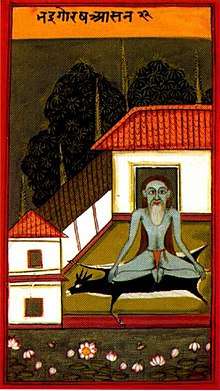Suzanne Newcombe
Suzanne Newcombe is a scholar of modern yoga as exercise, investigating the "interfaces between religion, health and healing".[1] She is known in particular for her work on yoga for women and yoga in Britain.[2][3]
Early life and education
Suzanne Newcombe grew up in Kansas. She studied religion at Amherst College in Massachusetts with a year at SOAS in London. She took a master's degree in Religion in Contemporary Society at the London School of Economics. She obtained her PhD at the University of Cambridge on the popularisation of yoga and ayurvedic medicine in Britain.[1]
Career
Newcombe is a researcher at the Open University, working on the sociology and social history of modern yoga and Ayurveda.[1][4][5] She edits and helped to found the Journal of Yoga Studies,[6] and the "Modern Yoga Research" website.[1][7] She is an INFORM research fellow at the London School of Economics.[8] Newcombe has appeared on BBC radio and television to discuss modern yoga and religious practices.[9]
Reception
Susan J. Palmer, reviewing Prophecy in the New Millennium for the Review of Religious Research, called the book "a rich and ground-breaking study that should stimulate a fresh interest in this enigmatic phenomenon."[10]
Benjamin D. Crace, reviewing the book for Nova Religio, describes it as "a concise introduction to prophecy, its history, current role, and trajectory" that explores why prophecy "continues to persist as modernity fails and the world becomes increasingly interconnected." Crace notes that "some readers will find the narratives more readable and interesting" than the scholarly analysis.[11]
Works
- 2013 Prophecy in the New Millennium: When Prophecies Persist, Routledge (edited, with Sarah Harvey) ISBN 978-1409449959
- 2017 The Revival of Yoga in Contemporary India Oxford Research Encyclopedias
- 2019 Yoga in Britain: Stretching Spirituality and Educating Yogis, Equinox ISBN 978-1781796610
See also
- Yoga in Britain, the focus of Newcombe's research
References
- "Dr Suzanne Newcombe". The Open University. Retrieved 17 March 2019.
- Newcombe, Suzanne (2007). "Stretching for Health and Well-Being: Yoga and Women in Britain, 1960–1980". Asian Medicine. 3 (1): 37–63. doi:10.1163/157342107X207209.
- Singleton, Mark (2010). Yoga Body : the origins of modern posture practice. Oxford University Press. p. 17. ISBN 978-0-19-539534-1. OCLC 318191988.
- "Suzanne Newcombe". Google Scholar. Retrieved 17 March 2019.
- "Dr Suzanne Newcombe". Modern Yoga Research. Retrieved 17 March 2019.
- "Journal of Yoga Studies". Journal of Yoga Studies. Retrieved 17 March 2019.
- "Modern Yoga Research". Retrieved 17 March 2019.
- "Suzanne Newcombe". The Conversation. Retrieved 17 March 2019.
- "Suzanne Newcombe". Embodied Philosophy. Retrieved 17 March 2019.
- Palmer, Susan J. (2014). "Sarah Harvey and Suzanne Newcombe (eds): Prophecy in the New Millennium: When Prophecies Persist". Review of Religious Research. 57 (1): 165–167. doi:10.1007/s13644-014-0196-8.
- Crace, Benjamin D. (2014). "Prophecy in the New Millennium: When Prophecies Persist Prophecy in the New Millennium: When Prophecies Persist . Edited by Sarah Harvey and Suzanne Newcombe . Ashgate Publishing Limited , 2013 . 295 pages. $124.95 cloth; $40.46 paper". Nova Religio: The Journal of Alternative and Emergent Religions. 18 (2): 112–113. doi:10.1525/nr.2014.18.2.112.
